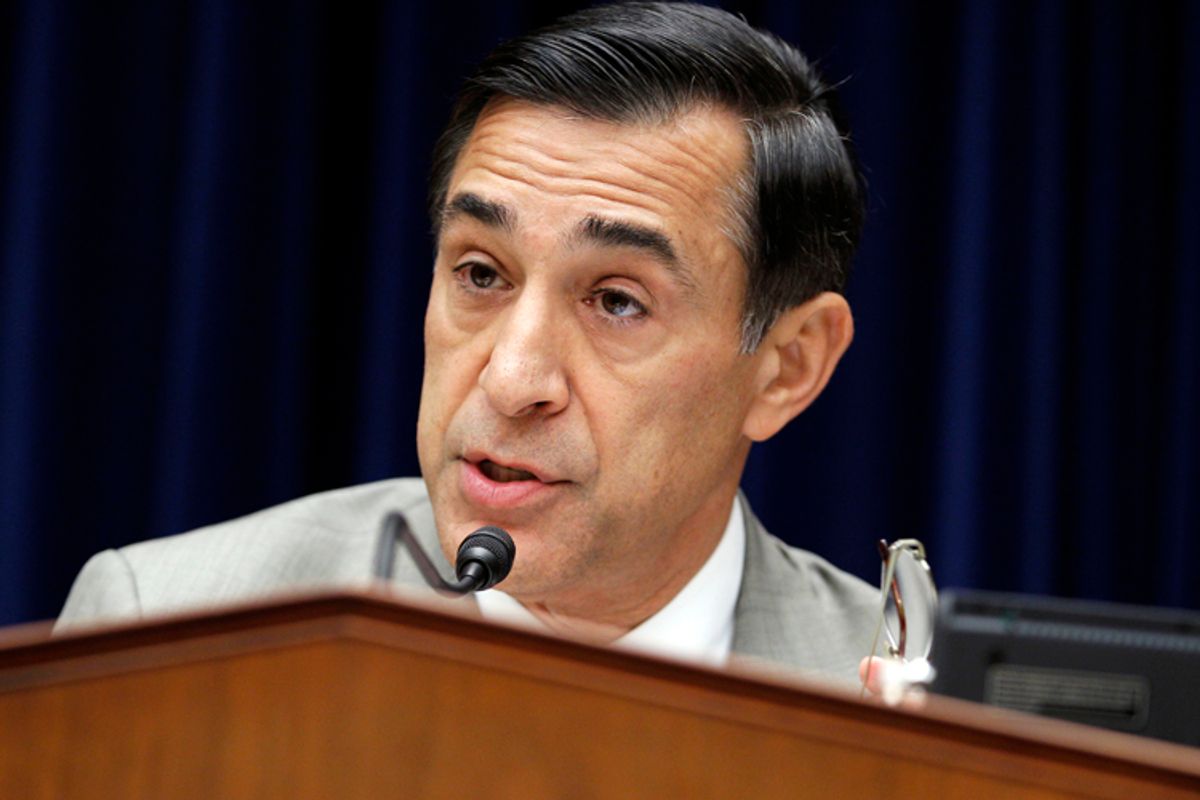Liberals have naturally never much cared for Darrell Issa, but after he seized on a Treasury Department inspector general report that appeared to show the agency had improperly singled out Tea Party tax-exempt groups for extra scrutiny, even we thought he might be on to something. Jon Stewart practically disowned the president. After a long string of failures, it looked like Issa had finally found something real, even if he was a bit overeager in hyping it.
How wrong we were. Now it's clear Issa played us this whole time, thanks to new documents that show the IRS also targeted "progressive" and "Occupy" groups, in addition to Tea Party ones. And if it targeted groups on both sides, it wasn't really singling anyone out (the only group actually denied tax-exempt status was a progressive one, after all) and the whole scandal falls apart.
It's not that there were no warning signs. In his zeal to implicate the White House, Issa jumped to conclusions unsupported by evidence. Then he selectively disclosed parts of transcripts that supported his narrative, and threw a fit when Democrats wanted to release the rest, which revealed that the IRS official in charge of the program was a conservative Republican. The whole scandal seemed to be falling apart, and now we know for sure.
Did Issa know the IRS targeted progressive groups too? Why didn't the inspector general's report mention this critical bit of data? Russell George, Treasury's IG, told lawmakers that the "inspector general launches audits on topics requested by lawmakers. The targeting audit requested by House Oversight and Government Reform Chairman Darrell Issa specifically requested a review of IRS actions related to conservative groups," Politico reported yesterday.
So it seems this entire scandal exists because Issa skewed the outcome of the IG report by asking to keep it narrowly focused on conservative groups, then trumped up its findings' charges and tried to keep exculpatory evidence out of the public eye. If this were court, the case would not only be thrown out, but Issa would be scolded for prosecutorial misconduct.
Of course, we probably should have seen this coming from Issa, who has been at best an unimpressive House GOP scandal czar, and at worst, an effective conspiracy theory huckster bolstered by the weight of his lofty office. Even some fellow Republicans have spoken up. “I really am concerned that it could tip this into the political realm rather than a true detailed investigation to get the facts out," Rep. Charles Boustany, a senior Ways and Means Republican who chairs the panel’s Oversight subcommittee, said of Issa's propensity to blab about any new details he finds while investigating.
Or take this Republican on Issa's committee: "Our committee, unfortunately does have a reputation for jumping to the end result." That Republican, it turns out, was Issa himself, explaining in 2011 why he was backing off on the Fast and Furious scandal.
That habit, along with his colorful personal history of car thefts and accusations of insurance scams, got Issa in trouble even before he took the helm of the Oversight committee. In 2010 he called Obama “one of the most corrupt presidents in modern times." He later apologized, telling CNN, "Do I think the president is personally corrupt? No. I should never have implied that.”
Four days after the 2010 election, Issa declared he would hold seven hearings a week on everything from WikiLeaks to Fannie Mae and Freddie Mac, to the FDA, to the Financial Crisis Inquiry Commission. None of those went anywhere and the hearings have slowed to a trickle. And some of his investigations have been downright ridiculous, like when he asked the Department of Justice to investigate ACORN more than a year after it ceased to exist, or when he said Joe Sestak's Senate campaign was "Obama's Watergate." Do you even remember Sestak's name, let alone the "scandal"?
Issa's biggest successes -- and also failures -- have been when dramatically overplaying his hand. Solyndra, Fast and Furious, Benghazi and now the IRS all followed the same format. In every case, instead of conducting a sober investigation, Issa picked a conclusion (the White House was involved!) and then desperately tried to find evidence to support it. In all cases, he came up way short.
But while other scandals fizzled out after months, the IRS controversy's collapse has been more dramatic. Just a month ago, it was dominating news coverage. Last week, it was reviving the zombie Tea Party. Now, it's a flaming ruin. At some point, this has to weigh on Issa's credibility. James O'Keefe may have more scalps than Issa, who has so far failed to land any body blows on the Obama administration, but both have been caught in one distortion and exaggeration after another. There was no singling out of Tea Party groups and it's hard to imagine Issa didn't know this earlier.
As Dartmouth professor Brendan Nyhan has said, it takes two to scandal. Issa can't do it alone. He needs credulous media coverage to make his work ginning up controversy successful. The media has spent almost two months on a story that has proved to be essentially a fiction. How many important stories didn't get covered because we were debating something that never happened? How many times does Issa have to cry wolf before the mainstream media will realize he has no credibility left.



Shares